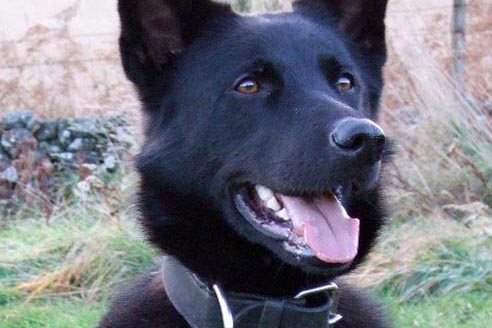MISHAPS involving police hounds and horses have cost Scottish forces nearly £250,000 in vets fees over the last five years.
Animal assistants of the boys in blue, including 15 dogs and two horses, have injured themselves from treading on broken glass to impaling themselves on tree branches.
In some sad cases though dogs were put down after catching illnesses and another hero canine was killed after being hit by a car while chasing a deer.

These unfortunate findings come after it was revealed last week Scotland’s new single police force will cut back on its number of dogs.
Police said all deceased animals were “very much missed” and praised them for their “important role” in frontline policing.
A Freedom of Information request showed the bill for patching up animals since 2007 has reached £249,269.34.
Strathclyde Police, whose total vet bill of £92, 390.02, reported:
“One of the Victim Recovery dogs ran into an upturned branch and punctured his chest whilst searching in an area of dense woodland. He made a full recovery.”
Tayside Police had a 7-year-old dog put down “following a sheep worrying incident” but no further details were given.
The force also recorded three unfortunate pooches were involved in incidents where one cut their paw on glass, one scratched their eye while carrying out an operational search and another bruised their tail during an unknown incident.
Fife Police, who at £10,116 had the smallest bill for animal doctors, noted one dog going “lame” after colliding with another dog while being exercised – it made a full recovery after rest and medication.
They also humanely destroyed a four-year-old dog “due to its temperament”.
In September 2008, Grampian Police recorded the tragic death of German shepherd Senga after she was knocked down by a vehicle while chasing a deer.
Just two months previously Senga was involved in a daring rescue when she plunged into the cold temperatures of the River Don to save a drowning suspect who tried to flee the scene of a housebreaking.
Grampian also humanely destroyed two other Alsatians – Jerry, four, and Rex, three, – after both suffered from medical conditions.
In 2008, Jerry was put down for an inoperable stomach problem and Rex was put to sleep in 2010 for “a suspected brain tumour having become overly aggressive”.
Both Strathclyde and Lothian and Borders – the only forces with mounted units – had to put horses down.
Strathclyde’s horse called New York, aged 10, was put down following a hairline fracture two days after being kicked while being turned out – this is when they are allowed to roam free in a field during a portion of the day.
Lothian and Borders, with the second largest veterinary costs of £74,149.62, also put down a nine-year-old horse in similar circumstances when there were “complications from a general anaesthetic following a cut caused whilst turned out.”
The Scottish SPCA said although veterinary bills may be high it is important to care for the “physical and mental needs” of police animals.
Chief Superintendent Mike Flynn said: “Man has been working animals for centuries and it is a sad reality that some animals are injured or killed while carrying out their duties.
“Indeed many pet animals come to harm while being exercised or playing through no fault of their own or their owners or handlers.
“Any animals that are used for working purposes should have all their physical and mental needs provided for and if an animal does become injured or unwell then necessary vet treatment should be sought.”
A Lothian and Borders Police spokesman said: “Our dogs and horses play an important role not only in the detection and prevention of crime, but in providing reassurance to our local communities.
“Sadly, on occasion, some of our animals pass away while still in active use by the Force.
“As a consequence of the important role our animals play they occasionally require veterinary treatment.
“The Force has an appropriate budget to cover any costs incurred.”
Inspector Paul Menzies from Grampian Police said: “Police dogs are an integral part of Grampian Police and they are an invaluable asset to have available.
“Our police dogs are highly trained and support our officers in a variety of situations, including dealing with drugs searches, hunts for missing people and general policing work.
“They also become members of the handlers’ family and most of them continue to keep them as pets when they are retired.
“The dogs that we have lost over the past few years are very much missed and their contribution to keeping Grampian safe is much appreciated.”
A Strathclyde Police spokeswoman said: “Our police horses and dogs provide vital support to frontline policing in a variety of situations, from searching for drugs or missing people to support at football games and demonstrations.
“The dogs generally serve around seven years and retire with their handlers. The horses’ length of service varies greatly and when retired are given to the World Horse Welfare Organisation to re-house.”
Last week Superintendent David O’Connor, president of the Association of Scottish Police Superintendents, said the country’s 135 police dogs will be reduced in numbers as part of a scheme to save £1.5billion.
He said: “As we’re moving from eight police forces to three territorial areas – north, east and west – there will be opportunities to reorganise the available police dogs including drugs, public and explosive dogs; and part of that will be making sure all of the areas continue to be well served.
“There will need to be a particular emphasis on some of the more remote and rural parts of Scotland such as the north and north-east where mountain rescue dogs require to be able to respond to an incident in time.
“Police dogs are involved in rescues all year round.”